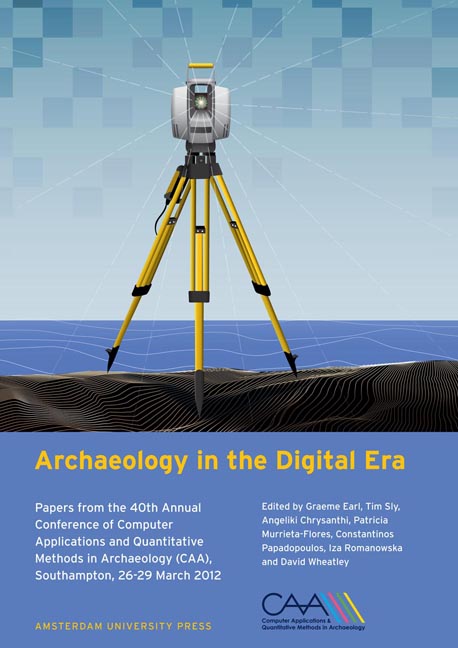 Archaeology in the Digital Era
Archaeology in the Digital Era Can you Hack (the) Communication?
Published online by Cambridge University Press: 16 February 2021
Summary
Abstract:
Existing practice presents a far greater challenge to the adoption of innovative technology than does the rain, the wind and the mud. Archaeologists do not like change. With cheaper more robust consumer technology we must turn our attention to the greater challenge - successful adoption. Communication is fundamental to overcoming this challenge. In April 2008 English Heritage purchased the hardware and software necessary to implement the Intrasis archaeological information management system. This was only the beginning. Many of our procedures were incompatible with Intrasis others were simply out of date. The adoption of Intrasis presented the opportunity to review these procedures. Implementing this change has led to a higher quality record, and we are seeing faster assessments and analyses. Ultimately, the greatest cost was not the hardware or software, but the time spent adapting to change. This paper will discuss the integration of Intrasis into our working practices at English Heritage. It will explore how the system was introduced to our specialist teams, the impact, the costs and the benefits that were eventually realised. The hope is that the lessons we have learned will persuade other archaeologists to persevere to overcome the technical, organisational and human pitfalls inherent in such change. So you’ve discovered the greatest archaeological tool since the trowel but can you hack the communication required to get archaeologists to use it?
Keywords:
Communication, Change Management, Excavation Recording
Introduction
Fully digital field-data recording has yet to be adopted by the vast majority of archaeologists. As has been the case for many years, archaeologists operate a hybrid recording environment where some of the information is born digital and the rest is captured onto paper (May 2004b). As cited elsewhere (Andrew 2000; Backhouse 2006), this separates excavation data collection from its interpretation. Digital systems supported by appropriate procedures can enhance interpretation in the field, improve data quality and accelerate projects to completion. However, the benefits of any system will be difficult to realise without good communication. This paper will explore these issues by looking at the implementation of the Intrasis Archaeological Spatial Database System (Intrasis 2012) within English Heritage.
- Type
- Chapter
- Information
- Archaeology in the Digital EraPapers from the 40th Annual Conference of Computer Applications and Quantitative Methods in Archaeology (CAA), Southampton, 26-29 March 2012, pp. 49 - 54Publisher: Amsterdam University PressPrint publication year: 2014


